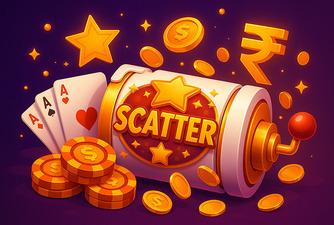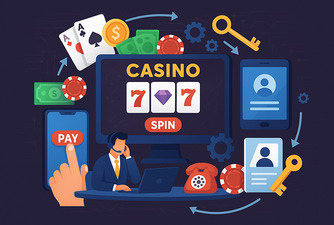Cloud Microservices: Improve Cross-Border Casino Transactions
These solutions are not just a trend, but the foundation for a reliable and flexible payment system. Such tools enable entrepreneurs to scale the financial infrastructure of entertainment platforms, integrate local settlement methods, and ensure real-time fault tolerance.
Rosloto experts talk about the architecture of microservices and their role in modern gambling.
About the Concept
Cloud Microservices in iGaming
Why operators choose microservices
Scalability
Handles peak loads (thousands of deposits at once)Geo-Distribution
Regional nodes reduce latency in LatAm, Asia, AfricaReliability
One module fails — others keep runningPayments and Integrations
Local providers in 1–2 days
Resilience
Auto-switch from Stripe to Trustly if failure occursUnified Wallets
Fiat, crypto, NFTs, mobile money in one interfaceBusiness Impact
30–50% Fewer
Abandoned depositsContinuous Updates
AML rules, crypto wallets, bonuses without downtimeThis is an approach in which each function of digital portals (for example, payment processing, KYC verification, or bonus logic) works as an independent product. It can be updated, scaled, and deployed separately while maintaining the overall viability of casino projects.
The popularisation of microservices occurred in 2015 due to the sharp growth of the Internet audience and the volumes of big data used to manage virtual resources. Before that, almost all iGaming brands were like large systems (monoliths). If there was an error in the program, then all its functions needed to be updated and tested.
Starting from the 2020s, more providers have been placing their microservices in the cloud.
Entrepreneurs cooperate with Amazon Web Services, Google Cloud, Microsoft Azure, and other IT companies, which gives them the following advantages:
- Flexibility under load. If, for example, on Friday evening, thousands of clients start making deposits at the same time (participate in tournaments or connect to live broadcasts), then the cloud program will automatically scale. It will allocate more resources to cope with the load, ensuring a comfortable and uninterrupted game.
- Geo-distribution. Microservices can be launched in different parts of the world so that they are closer to customers (for example, in South America, Asia, or Europe). This reduces streaming interruptions and makes the interface more responsive.
- Increased reliability. If one module (for example, a bonus system) is damaged, the other components will continue to work stably. Gamblers will be able to place bets, replenish their accounts, and spin reels in slots, while access to branded bonuses will be quickly restored.
Cloud Solutions and Online Casino Payment Policies
Let us consider how microservices improve cross-border transfers in the entertainment niche.
Transaction Processing Speed
In classic (monolithic) systems, all requests go through the main server or a limited pool of data centres. They are often located in Europe or the USA, which, for example, creates delays when working with clients in Latin America, Asia, or Africa.
Thanks to the implementation of cloud microservices, transaction processing is transferred to regional edge nodes or CDN infrastructure. The module is deployed in each key region, which reduces response time even in countries with an unstable Internet connection.
As a result, players do not experience “freezes” when purchasing iGaming products. This increases the conversion of deposits and user satisfaction with the level of customer service.
Integration with Local Payment Providers
Each region requires a connection to local financial systems.
For example, in Brazil, Pix processes the largest volume of transactions, and UPI has been the leader in India for many years. Casino visitors in the Asian market most often choose GrabPay, GCash, or Alipay, and residents of the Netherlands trust the iDEAL national platform.
Thanks to the use of microservices:
- each provider is connected as a separate plugin, regardless of its localisation;
- modules can be integrated without stopping the entire gambling portal’s operation;
- the time for the addition of a new provider is 1–2 days, while with the old architecture, it took engineers several weeks.
All this ensures a faster, barrier-free entry into new markets and reduces the number of system failures even at the stage of testing. The relevance and localisation of settlements can be changed in real time, without affecting the overall functionality of the entertainment site.
Fault Tolerance
Payment providers can break down, which is normal in a modern and information-overloaded world. Working in the cloud minimises the risks of stopping transfers if, for example, one of the connected systems is temporarily crashed.
The whole point is that microservices operate through load balancers. In case of failure, one module instantly switches to a backup one, say, from Stripe to Trustly. The switching logic is specified in the technical parameters of the gambling platform and is activated automatically.
As a result, the number of unfinished transactions (abandoned deposits) is reduced by 30–50%. Online casinos work stably and without interruptions, which increases the level of confidence among players.
Updates Without Interruptions
Interaction with cloud solutions allows entrepreneurs to:
- actualise exchange rates;
- implement new AML algorithms;
- integrate crypto wallets or NFT settlements;
- support the logic of bonuses accrued upon the first or repeated deposit.
All updates are made pointwise, without affecting the main payment program. Changes are made 5–10 times faster compared to working in a traditional architecture.
Unification of Currencies and Wallets
Today, the iGaming industry is a hybrid of fiat and crypto systems. Players can use dollars and euros, blockchain tokens, internal coins, mobile money (Airtel, M-Pesa), non-fungible tokens, and other settlement methods.
Microservice currency API performs the following tasks:
- deal with real-time conversion;
- automatically routes payments between gateways;
- takes into account commissions and local restrictions.
This makes it easier for operators to manage finances and control the cross-rate. As for users, they get a single and clear payment interface, even if they use USDT and fiat money at the same time.
Legislative Framework

Let us consider key regulatory aspects related to connecting to microservices:
Licensing
To legally use cloud infrastructure for real-money gambling, entrepreneurs must:
- have permission from a recognised authority (UKGC, MGA, KSA, the Isle of Man, etc.);
- indicate cloud hosting in the registration documentation;
- ensure localisation of confidential information, if required by the jurisdiction.
Data Hosting
Brands with European registration must store personal information (about customers, B2B partners, and transactions) within the EU/EEA or in regions with equivalent protection. This condition is stipulated in the GDPR.
The German regulator GGL puts forward additional requirements for storing game magazines, conclusions, and logs in local centres. The Swedish state body, Spelinspektionen, also allows the use of cloud hosting, but only for verified providers.
Certification
The activities of cloud companies must comply with the following international standards:
- PCI DSS — safe payment data processing;
- ISO/IEC 27001 — information security;
- SOC 2 — access control and privacy;
- GDPR, UK GDPR, LGPD, CCPA — customer data protection.
Which Cloud Infrastructure to Choose

Let us consider the features of well-known providers (AWS, GCP, or Azure) and how compatible they are with the entertainment industry.
Amazon Web Services
The international IT company manages dozens of data centres in key iGaming regions. These are Europe, Asia, Latin America, and North America.
The vendor also offers:
- comprehensive support for microservices (AWS Fargate, Lambda, EKS, Step Functions, etc.);
- reliable architecture;
- advanced security tools;
- a modern DevOps stack (CodePipeline, CloudFormation, and X-Ray) for independent launch and testing of the product.
AWS cooperates with casinos, but narrowly and subject to licences.
The supplier requires entrepreneurs to:
- provide copies of valid certificates (for example, MGA, UKGC, or Curacao);
- not offer gambling services in jurisdictions with restrictions (for example, the US, UAE, and China).
Large operators actively use AWS as their main infrastructure. These are Betway, Kindred, 888 Holdings, and other market leaders.
Google Cloud Platform (GCP)
The portal has several advantages:
- Strong analytics. The software contains tools for working with Big Data. These are BigQuery, Looker, Vertex AI, and other advanced functions.
- Containerisation and DevOps. The availability of Cloud Run, GKE (Google Kubernetes Engine), and Cloud Build will be useful for iGaming firms with a strong team of programmers.
- Neural networks and A/B tests. Built-in ML solutions can be used to analyse customer behaviour and identify fraud.
- Network capabilities. GCP supports fast and stable channels between different regions.
The system cooperates with entertainment brands, provided that they comply with local laws.
To connect a traditional online casino to GCP, it is necessary to pass an external compliance assessment. Besides, Google automatically limits work in countries and regions with an ambiguous attitude of local authorities toward the placement of bids.
Today, GCP is successfully used in the fantasy sports and social gambling sectors. Interaction with other verticals (casinos, betting, or lottery business) requires a targeted approach and conformity procedures.
Microsoft Azure
A corporate focus is the main advantage of this solution. It integrates well with banking or fintech services, maintains a high level of security (PCI DSS, ISO 27001, GDPR), and contains tools for checking legal compliance (Azure Purview and Policy Manager).
Microsoft Azure allows iGaming companies to host data, but requires:
- licence confirmation;
- compliance with the policies of countries (especially if information centres are used in the EU, the UK, or Malta);
- passage of due diligence on AML, KYC, and RG.
The company cooperates with various B2B providers, especially in the field of CRM, ERP, and BI solutions. Many entrepreneurs use the system’s capabilities to form VIP analytics and support responsible gambling.
The Main Things about Microservices in the Casino Niche
The use of cloud infrastructure is a long-term trend in the entertainment industry.
Key aspects that project owners should take into account:
- The advantages of the concept include increased payment processing speed, fault tolerance, and automatic system updates. Microservices provide instant unification of currencies and wallets, as well as seamless integration with local settlement methods.
- Amazon Web Services, Google Cloud, and Microsoft Azure are considered leaders in the provision of cloud solutions. IT companies cooperate with the gambling sector, but only if the entrepreneurs have licences and comply with AML/KYC procedures.
The Rosloto studio has vast experience in the international casino market. We will help you obtain permission, launch and scale iGaming startups, connect to a reliable cloud infrastructure, and much more.
From us, it is possible to order a turnkey project, a White Label portal, as well as certified gambling and payment software.
Check the information used to contact us carefully. It is necessary for your safety.
Fraudsters can use contacts that look like ours to scam customers. Therefore, we ask you to enter only the addresses that are indicated on our official website.
Be careful! Our team is not responsible for the activities of persons using similar contact details.


































